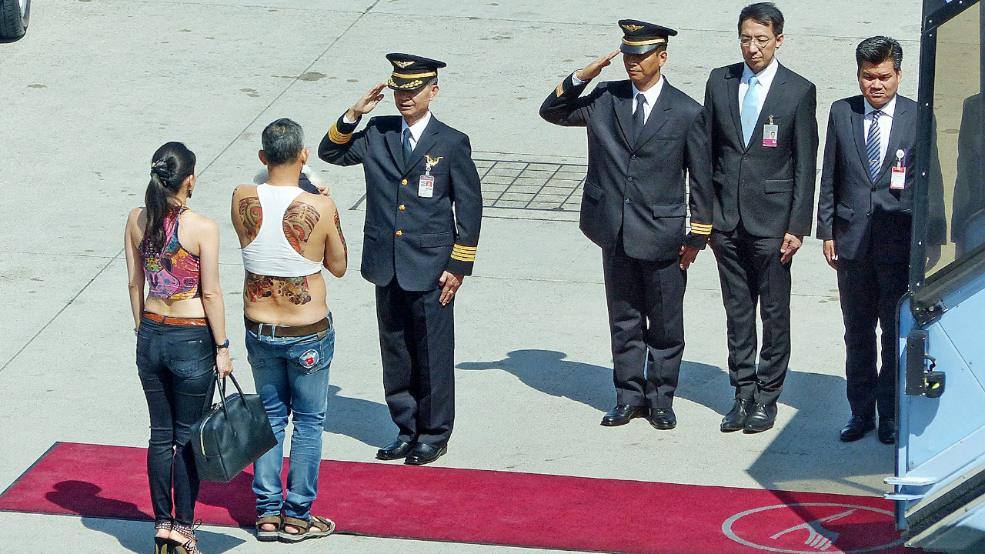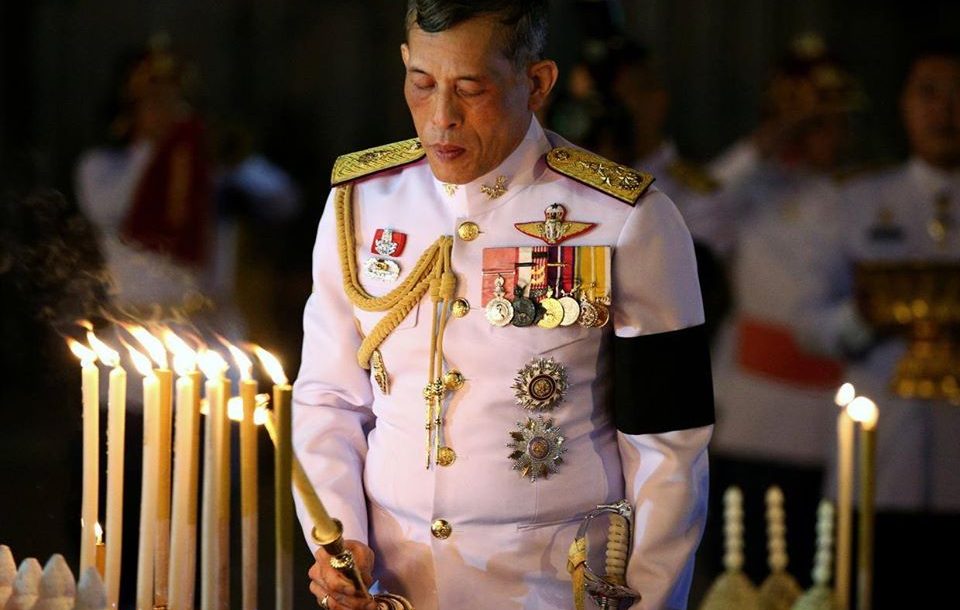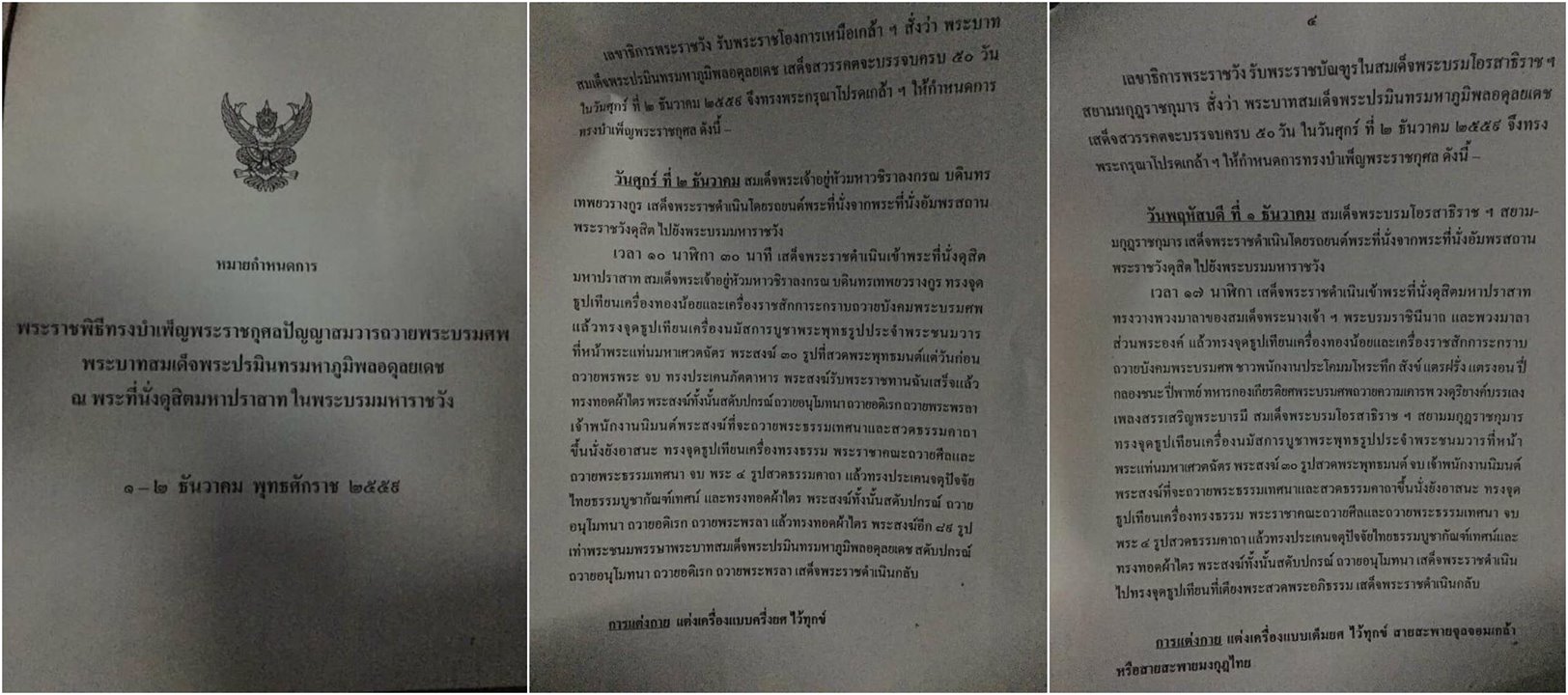Andrew MacGregor Marshall brings you a quick guide to the anticipated naming of Thailand’s new King.
Thailand is finally getting a new king this week, ending seven weeks adrift in constitutional limbo following the death of King Bhumibol Adulyadej on October 13.
The National Legislative Assembly — a fake parliament full of the unelected cronies of the junta — held a special session today to formally acknowledge the fact that Crown Prince Maha Vajiralongkorn is the designated heir to the throne of Thailand. The next step is for Pornpetch Wichitcholchai, the powerless president of the rubber-stamp body, to have a personal audience with Vajiralongkorn to formally invite him to become King Rama X.
Unfortunately, however, Vajiralongkorn is not even in Thailand to accept the invitation. He has spent most of the past month in Munich, his main place of residence since 2007, and has not yet returned to Bangkok. He is scheduled to leave Munich on Thai Airways flight TG925 tomorrow at 1335 local time, arriving in Bangkok at 0610 on December 1.
A leaked palace document, sent to Thai ministries yesterday, shows that there will be more bureaucratic ceremonies on Thursday and Friday. Vajiralongkorn is expected to formally accept the invitation around 1630 local time on Thursday, a moment that the palace astrologers say is auspicious, and at that point he will — finally — officially be king.
After he becomes King Rama X, an auspicious new name may be announced for Vajiralongkorn. There were also plans to announce that all Thais should wear cream-coloured clothes for a week between December 2 and 9, instead of the black clothing they are supposed to be wearing in mourning for King Bhumibol, but this idea appears to have been dropped, probably because officials realised that most Thais would refuse to follow the instruction given the extreme unpopularity of the crown prince.
The junta is doing its best to pretend that everything is proceeding according to plan and in line with the constitution, and this week’s bureaucratic theatrics are intended to give that impression. Much of the international media has understandably been fooled by this. But the reality is that the succession has been shambolic.
All the events of this week — the National Legislative Assembly formally acknowledging Vajiralongkorn as the designated heir, the assembly president formally inviting him to become king, and the crown prince accepting the invitation — were supposed to happen seven weeks ago on the evening of October 13 on the same day that Bhumibol died.
Within minutes of the official announcement of Bhumibol’s death, dictator Prayuth Chan-ocha declared in a televised announcement that Vajiralongkorn would be proclaimed the next monarch. But everything was thrown into confusion when the crown prince blindsided everybody by declaring that he didn’t want to be named king right away. Ever since then, Thailand has been mired in a constitutional mess, however much the junta tries to deny it.
As I explained in an analysis last month, there is no constitutional provision for the heir to the throne to delay being proclaimed king. If Vajiralongkorn didn’t want to start performing his royal duties right away, the constitutional way to accommodate this would be for him to be proclaimed king and then appoint a regent to reign on his behalf until he felt ready to do the job himself. But nobody in the junta dared raise this with the crown prince.
In 1946, Bhumibol Adulyadej was proclaimed monarch the same day he had accidentally killed his 20-year-old brother King Ananda Mahidol, in spite of his understandable shock and distress. Soon afterwards he fled abroad to Switzerland, and he only began doing his royal duties in Thailand at the end of 1951. But he had formally been king the whole time.
In contrast to the utterly unexpected and shattering events of June 9, 1946, Bhumibol’s death was not only expected, it was actually stage managed to take place at a convenient moment for the junta and the crown prince. The elderly monarch had been in a vegetative state for several months. So there is no valid excuse for why the junta and the crown prince violated not only the constitutional process for proclaiming a new monarch but also Section 6 of the 1924 Palace Law on Succession which states (emphasis added):
Once the King has designated the Heir to the Throne and has had such designation proclaimed to members of the Royal Family, officials and the public at large, the position of such Heir is secure and indisputable. When the necessary time comes, the said Heir shall immediately ascend the throne to succeed the late King in accordance with the latter’s wish.
The delay led to all kinds of constitutional conundrums. The junta said Prem Tinsulononda, the ancient scheming former general who for decades had been at the centre of the web of the network monarchy, would be regent until Vajiralongkorn was ready to reign. But the job of a regent is to reign on behalf of the king — the role makes no constitutional sense when there is no king. Never before since the start of the Chakri dynasty in 1782 has there been a seven-week interregnum between monarchs.
So don’t be fooled by the junta’s efforts to pretend that the events of this week are following tradition, or following some kind of plan. What is actually taking place is that over several days of absurd theatrics, the junta will finally do what it was supposed to do in a single evening on October 13. They are trying to clean up the constitutional mess caused by the crown prince in a face-saving way, by pretending that it is perfectly normal to wait seven weeks to proclaim a new king, and even then have to spend several more days waiting for an answer, as he reluctantly returns from Germany.

Notorious photograph of Vajiralongkorn and new wife Suthida at Munich Airport, published by German newspaper Bild.
It has been a humiliation for the junta, and this was deliberate. By very publicly showing that he will do whatever he wants, whenever he wants, Vajiralongkorn was sending a signal that he is does not regard himself as beholden to Prayuth and his cronies. He is doing things according to his own timetable and his own whims, whether or not this is convenient for the junta and in line with the constitution and palace law. He doesn’t care about what the law says or what Prayuth wants. He is trying to show he’s the boss.
The procedure in which a new monarch has to be invited by parliament to become king is relatively new in Thai history — the practice only began after the absolute monarchy was overthrown in 1932. Before that, the royals did whatever they pleased, and were answerable to no-one. Many royalists — and royals — have never accepted that the monarchy should be subordinate to parliament and the constitution. Two senior sources who meet regularly with Vajiralongkorn say he is contemptuous of the idea that he needs to be invited by anyone to become king. He regards it as his birthright.
The question is how long Thailand’s top generals will tolerate being treated with contempt by the new king. The military and the monarchy desperately need each other as they struggle to maintain their dominant influence in Thailand and somehow stand against the tide of history. Vajiralongkorn may enjoy humiliating the junta and acting with impunity, but if he loses the backing of the army whatever power he possesses will melt away.
The military’s compulsive coup habit and incessant meddling in politics was enabled for decades by widespread popular reverence for Bhumibol. That era is over now. Vajiralongkorn is widely loathed in Thailand and can never bestow a legitimising royal aura to make dictatorship more palatable. For the moment, the generals have decided that it still makes sense to indulge Vajiralongkorn and try to keep the cult of royalism alive. But if they conclude that his antics make him more of a liability than an asset, they could engineer his downfall.
Many of the elite Thais who know Vajiralongkorn best have long feared his antics would destroy the monarchy. Nobody has ever managed to keep him under control for long, and now that he is king he will be even more difficult to manage. One of the most revealing leaked diplomatic cables from the U.S. embassy in Bangkok recorded comments from some of Thailand’s leading elder statesmen to ambassador Eric John that clearly showed how much they dreaded the prospect of Vajirlongkorn becoming king.
The cable quoted former prime minister and palace insider Anand Panyarachun as saying that “the consensus view among many Thai was that the Crown Prince could not stop” and “nor would he be able to rectify his behaviour”.
Once the absurd theatrics of this week are over, we will soon find out.
Andrew MacGregor Marshall is a journalist, lecturer at Edinburgh Napier University, and author of ‘A kingdom in crisis’.
This article was first published on his Facebook platform, which can be viewed at https://www.facebook.com/zenjournalist
 Facebook
Facebook  Twitter
Twitter  Soundcloud
Soundcloud  Youtube
Youtube  Rss
Rss 
